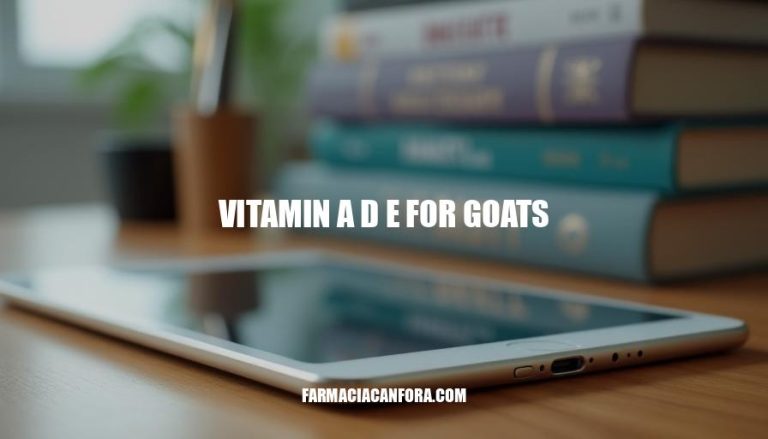


Vitamin A, D, and E are important for healthy goats. They help with growth, immunity, and overall health.
Vitamin A is good for vision, cell growth, and reproductive health. It helps keep the body’s protective barriers strong, which prevents infections.
Without enough vitamin A, goats can get sick easily and have problems growing.
Vitamin D is crucial for strong bones in goats. It helps them develop properly and prevents diseases like rickets. If goats don’t get enough vitamin D, their bones might be weak or deformed.
Vitamin E protects the body from damage and supports muscle function.
It also helps with immune responses and prevents a disease called white muscle disease. Without enough vitamin E, goats can get sick more easily and have reproductive problems.
These vitamins are all important for healthy growth, reproduction, and disease resistance in goats. If they’re missing one or more of these nutrients, their health will suffer, and they might get sick more often.
To keep goats healthy, it’s essential to provide them with the right nutrition and supplements.
Vitamin A is essential for goats as it supports vision, immune function, and reproductive health. It helps maintain healthy skin and mucous membranes, reducing the risk of infections. Natural sources include green forage, such as fresh grass and leafy hay, which are rich in beta-carotene.
During periods when fresh forage is unavailable, supplementation with vitamin A or beta-carotene is necessary to prevent deficiencies.
Vitamin D plays a crucial role in calcium and phosphorus absorption, which are vital for strong bones and teeth. It prevents conditions like rickets in kids and brittle bones in adults. Goats synthesize vitamin D through exposure to sunlight, making outdoor grazing an excellent source.
For goats kept indoors or during seasons with limited sunlight, vitamin D supplementation through fortified feeds or injections is recommended.
Vitamin E is a powerful antioxidant that supports muscle function, reproductive health, and immune response. It works synergistically with selenium to prevent white muscle disease, a condition that affects young kids. Fresh forage and high-quality hay are natural sources of vitamin E.
In cases where forage quality is poor, supplementation with vitamin E and selenium is necessary to ensure adequate intake.
To ensure goats receive sufficient vitamins A, D, and E, provide access to fresh forage and sunlight whenever possible. Monitor their diet, especially during winter or dry seasons, and incorporate high-quality supplements as needed. Regular health checks and consultation with a veterinarian can help tailor a nutrition plan to meet the specific needs of your herd.
Maintaining proper levels of vitamins A, D, and E is crucial for healthy growth, reproduction, and disease resistance in goats. These essential nutrients support vision, immune function, bone development, muscle function, and reproductive health.
Without sufficient amounts, goats can become susceptible to infections, diseases, and developmental issues.
A balanced diet that includes fresh forage, sunlight, and high-quality hay is the best way to ensure adequate vitamin intake. However, during periods of limited access to these resources, supplementation with vitamins A, D, and E may be necessary to prevent deficiencies.
Regular health checks and consultation with a veterinarian are essential to monitor goat nutrition and identify potential issues early on. Responsible supplementation can help prevent deficiencies and promote optimal goat health.
By prioritizing balanced nutrition and regular health monitoring, goat owners can ensure their animals receive the nutrients they need to thrive.